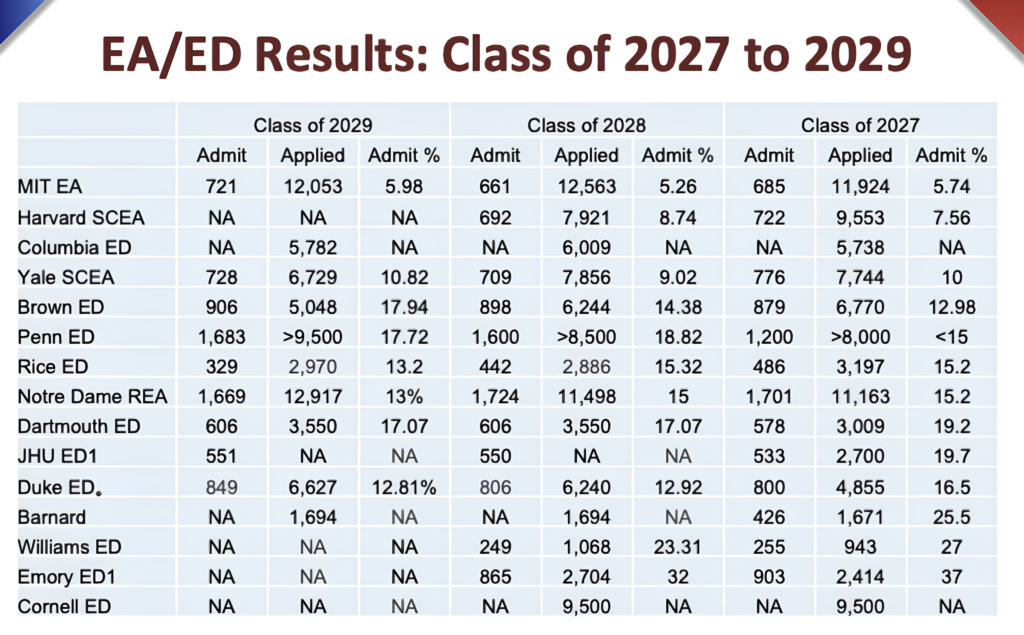REA, ED, EA, RD Differences: A Strategic Guide for College Applicants
目录
Why Application Type Matters
When applying to college, your timing matters almost as much as your application content. The choice between Early Action (EA), Early Decision (ED), Restrictive Early Action (REA or SCEA), and Regular Decision (RD) isn’t just a matter of deadline preferences—it’s a strategic decision that can influence your acceptance outcomes, scholarship opportunities, and stress levels throughout senior year.
In an era of increasingly competitive college admissions, especially at top U.S. institutions, applying strategically is essential. Some application plans offer a statistical edge, while others provide flexibility or a lower-pressure timeline. Understanding the nuances behind each option is the first step toward building an intelligent, customized admissions strategy.
Definitions & Key Features
1. Early Decision (ED)
Early Decision is a binding application plan. If you’re accepted under ED, you must attend that school and withdraw applications to all other institutions.
Key Details:
Binding: Yes. You’re making a contractual commitment.
How many schools: Only one.
Used by: Columbia, UPenn, Brown, Cornell, Northwestern, and more.
Deadline: Start from the middle of October
Decision Release: Mid-December.
Ideal for: Students with a top-choice school, strong grades by junior year, and no need to compare financial aid packages.
Strategic Tip: Applying ED can significantly boost your chances—some schools accept up to 50% of their class in ED rounds.
2. Early Action (EA)
Early Action is non-binding. You apply early, hear back early, but you’re not required to commit.
Key Details:
Binding: No.
How many schools: Unlimited (unless applying to a REA/SCEA school).
Used by: MIT, Caltech, Georgia Tech, University of Michigan.
Deadline: Usually Nov 1–15.
Decision Release: Mid-December to January.
Ideal for: Students who want to reduce stress with early results and retain full decision flexibility.
Strategic Tip: EA lets you receive multiple early acceptances and use those to inform your RD strategy or negotiate financial aid offers.
3. Restrictive Early Action (REA)
REA is non-binding but limits your ability to apply to other private schools early.
Key Details:
Binding: No.
How many schools: Only one private (you may apply to public EA schools).
Used by: Stanford, Notre Dame, Caltech.
Deadline: Early November.
Ideal for: Students targeting a specific top private school but not ready to commit.
Strategic Tip: REA shows strong interest while preserving RD flexibility. It’s ideal for students with outstanding applications who don’t want to give up other options.
4. Single Choice Early Action (SCEA)
SCEA is a subtype of REA used by the most selective universities.
Key Details:
Binding: No.
How many schools: One private early school (you can apply EA to public institutions).
Used by: Harvard, Yale, Princeton, Stanford.
Deadline: Typically Nov 1.
Decision Release: Mid-December.
Ideal for: Applicants to Ivies/top 10s who want to send a strong signal of interest without obligation.
Strategic Tip: Acceptance rates for SCEA schools are generally higher than RD, but not as high as ED at other colleges. Choose this plan only if you’re academically competitive and prepared early.
5. Regular Decision (RD)
The most common and flexible route.
Key Details:
Binding: No.
How many schools: Unlimited.
Used by: All accredited U.S. colleges.
Deadline: Jan 1–15.
Decision Release: March–April.
Ideal for: Students building their profiles during senior year or wanting to compare multiple offers.
Strategic Tip: Despite being most competitive statistically, RD offers time to improve GPA, collect stronger recs, or retake tests.
Comparative Chart
| Application Type | Binding | Apply to Multiple Early Schools | Must Attend if Accepted | Must Withdraw Other Apps |
|---|---|---|---|---|
| Early Decision | ✅ Yes | ❌ No | ✅ Yes | ✅ Yes |
| Early Action | ❌ No | ✅ Yes | ❌ No | ❌ No |
| Restrictive Early Action | ❌ No | ❌ No (private) / ✅ Yes (public) | ❌ No | ❌ No |
| Single Choice Early Action | ❌ No | ❌ No (private) / ✅ Yes (public) | ❌ No | ❌ No |
| Regular Decision | ❌ No | ✅ Yes | ❌ No | ❌ No |
Application Type Combination
Allowed Combinations:
EA to multiple schools + RD
SCEA + public EA schools + RD
REA + RD
Not Allowed:
ED + any other early plan (ED is one and done)
ED + REA/SCEA
SCEA + private EA or ED
REA + other private early plans
Tip: Carefully review each school’s admissions policy—many publish detailed restrictions for early plans. Violating these may disqualify your application.

IvyMax Insights: Real Data & Outcomes
At IvyMax, we’ve tracked thousands of students over the years. Based on our previous data:
459 IvyMax students were admitted to Top 30 colleges.
78 offers came through ED or EA rounds.
Over 82% of acceptances occurred during the Regular Decision round—proof that RD remains crucial, especially for students not ready to apply early.
Should I choose Early Action or Early Decision?
Apply Early Decision if:
You have a true top-choice school
You’ve completed your application by early fall
You’re comfortable committing regardless of aid
Apply Early Action if:
You want early feedback to reduce anxiety
You’re applying to multiple schools
You want to preserve your flexibility
Apply REA/SCEA if:
You’re targeting a school like Stanford or Harvard
You’re not ready to commit, but want to show serious interest
You’ve read the school’s policy carefully
Apply Regular Decision if:
You’re still improving academically or waiting on new achievements
You want to apply to many schools
You need to compare aid packages
At IvyMax, our experienced college admissions counselors understand that no two students are the same. Your academic strengths, extracurricular profile, dream school preferences, and financial considerations all play a role in determining the best-fit application strategy. That’s why we don’t believe in one-size-fits-all advice. Whether you’re leaning toward Early Action for flexibility or considering Early Decision for a competitive edge, our counselors will provide personalized guidance to help you choose the most strategic and effective admissions plan—maximizing your chances of getting into your top-choice schools.
Final Takeaways from IvyMax
Early Decision/SCEA applicants often have a statistically higher chance but must apply early and commit to limited options.
Early Action offers flexibility with some strategic benefit.
Regular Decision remains the main route for most students—especially those applying to multiple competitive schools or who need more prep time.
Key Reminder:
Key Reminder from IvyMax Counselors:
While early application rounds (ED, SCEA, REA) may statistically boost your odds, they are also the most competitive pools. If your application isn’t polished enough—especially when compared to other early applicants who tend to be highly qualified—you risk being waitlisted. And here’s the catch: once you’re on the waitlist, admissions officers will revisit your profile only after reviewing the entire RD applicant pool, which often includes thousands of strong contenders.
This means a premature early application might actually reduce your chances—whereas a well-prepared Regular Decision submission could stand out more.
Need Help Choosing? IvyMax Can Help
Selecting the right application strategy is as important as choosing your college list. If you’re unsure how to weigh your options or want to improve your chances with a strong, early application, IvyMax’s college admissions experts are here to help.
Let IvyMax help you develop a personalized admissions plan—one that aligns with your academic profile, career goals, and timeline.
提交表单即代表您同意接收 IvyMax 的最新资讯和课程信息。您可以随时通过邮件底部的 SafeUnsubscribe® 链接取消订阅。
对我们的项目感兴趣?
请填写表单,我们会尽快回复您,并提供详细信息,解答您的问题!

